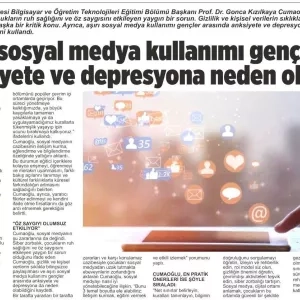Should We Save Our Children from Social Media?

Social media can encourage learning, broaden our understanding of the world, keep us informed about our surroundings, and sometimes even spark creative ideas. However, its harmful effects become apparent when not used properly, especially for children. Experts warn that excessive use can lead to anxiety and depression. Parents, focusing more on its negative impacts, often express their concerns with statements like, "We can't detach or save our kids from social media!" But should we be trying to 'rescue' our children from social media? Prof. Dr. Gonca Kızılkaya Cumaoğlu, Vice Dean of the Faculty of Education at Yeditepe University and Head of the Computer and Instructional Technologies Education Department, explains how social media can positively contribute to children's lives.
Social Media; Enables Communication, Provides Entertainment and Offers Information
In an era of ubiquitous social media, Prof. Dr. Gonca Kızılkaya Cumaoğlu reminds us that almost all children, like adults, are active on these platforms.
Prof. Kızılkaya says :"They spend a significant part of their time in popular online environments. When we try to manage this process, we either completely ban it with great anxiety or reach a point of exhaustion with unenforceable rules and let things slide,".
As we all witness, the appeal of social media lies in its capacity for communication, entertainment, and information. Prof. Dr. Cumaoğlu points out that this enables easy access to educational content, enhances learning and curiosity, discloses individuals to different perspectives, and increases global awareness of cultural differences. Prof. Cumaoğlu also highlights the importance of not ignoring the opportunities it provides for acquiring creative ideas and self-expression.
Negative Impacts OnSelf-Esteem
Gonca Kızılkaya Cumaoğlu points out the potential harms of social media:
"Foremost is cyberbullying, a widespread issue adversely affecting children's mental health and self-esteem. The unconscious sharing of privacy and personal data is another critical concern. Moreover, excessive social media use can cause anxiety and depression among young people."
Prof. Dr. Cumaoğlu, acknowledging both the benefits and the irresistible allure of social media, which makes it hard to keep our children away, noted how it can be effectively managed:
"We can handle this on three main fronts: Communication, education, and effective monitoring. To summarize the most practical recommendations;
Set Clear Boundaries: Define clear rules and guidelines. For example, screen time limits can be an initial boundary. Designate specific areas in the home, like during family meals or before bedtime, where phone use is not allowed. Do not permit access to age-inappropriate platforms. There's a reason why many platforms have age restrictions.
Teach the Importance of Verifying Information: Discussing their experiences fosters trust and awareness. Establish open, trust-based communication so they feel comfortable discussing their online experiences with you. Discuss the potential risks and benefits of social media. Educate them about online safety, responsible behavior, and the importance of privacy. Encourage critical thinking. For example, they should question the accuracy of the information they encounter.
Monitor and Guide: Using parental control tools and steering children towards healthy online practices is critical. Utilize parental control features on social media platforms. These controls can help manage content and screen time and monitor your child's online activities. Stay informed about social media trends and apps. This knowledge helps understand potential risks and provides practical guidance. If you notice concerning behavior or content, address it immediately. Discuss why it's inappropriate, empathize with situations that have or could arise, and guide them towards better choices.
Be a Role Model: Children often imitate their parents, so demonstrate healthy digital habits and limit your usage. Share your positive and negative experiences on social media. This will provide them with insight and guidance.
Teach the Importance of Privacy: Help your child understand the importance of privacy. Clearly explain the negative consequences of the violation of their confidential information. Show them how to configure privacy settings on social media platforms to control who can see their posts and personal information.
Encourage Offline Activities: Promote a healthy balance between online and offline activities. Encourage hobbies, sports, and other interests that are not screen-based.
Discuss Cyberbullying: Discuss cyberbullying and how to deal with it. Whether they are victims or bystanders, please encourage them to share any instance of bullying with you. Discuss the legal consequences of cyberbullying.
In conclusion, understanding the digital environment is key to helping children navigate it safely. By setting reasonable boundaries, maintaining open communication, and actively guiding, social media can positively contribute to their lives."
Media: Sabah | Vatan | Aydınlık | DHA | AA



